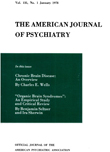A COMPARISON OF PROMAZINE AND PARALDEHYDE IN 175 CASES OF ALCOHOL WITHDRAWAL
Abstract
A comparison was made of the treatment of the alcohol withdrawal syndrome with either promazine, paraldehyde or promazine-paraldehyde combined. 175 patients, 136 without delirium tremens and 39 with delirium tremens, were studied.
Promazine was found to be better than either paraldehyde or promazine-paraldehyde combined, in the categories of early discharge from the hospital, decreased agitation and anxiety, and return to normal eating and sleeping patterns.
When the delirium tremens group treated with promazine was compared with the group treated with paraldehyde, there was not a significant difference.
Vomiting was approximately the same in all groups. Convulsions were more frequent in the groups treated with promazine, but not significantly so. Postural hypotension was a frequent complication of promazine therapy.
Ward management of the patients who did not receive paraldehyde was easier than of those who did receive it. It appeared that with the use of promazine many of the patients could have been managed in a general hospital.
Access content
To read the fulltext, please use one of the options below to sign in or purchase access.- Personal login
- Institutional Login
- Sign in via OpenAthens
- Register for access
-
Please login/register if you wish to pair your device and check access availability.
Not a subscriber?
PsychiatryOnline subscription options offer access to the DSM-5 library, books, journals, CME, and patient resources. This all-in-one virtual library provides psychiatrists and mental health professionals with key resources for diagnosis, treatment, research, and professional development.
Need more help? PsychiatryOnline Customer Service may be reached by emailing [email protected] or by calling 800-368-5777 (in the U.S.) or 703-907-7322 (outside the U.S.).



